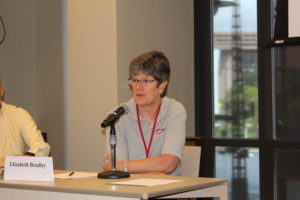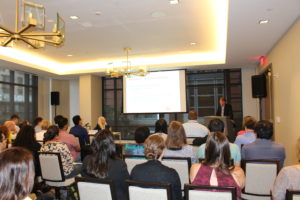 As part of the Computing Community Consortium (CCC) Early Career Researcher (ECR) Symposium, described in full here, we featured a number of visioning workshops CCC has held over the past year. CCC task force members and workshop organizers led the talks. The purpose of these sessions was to bring the community together, tell them what the CCC is doing, and then see if they could provide more insight. All the discussions that were generated from the sessions seemed to follow a general idea- computer science did X so now how do we move forward? See all the videos from the different sessions here.
As part of the Computing Community Consortium (CCC) Early Career Researcher (ECR) Symposium, described in full here, we featured a number of visioning workshops CCC has held over the past year. CCC task force members and workshop organizers led the talks. The purpose of these sessions was to bring the community together, tell them what the CCC is doing, and then see if they could provide more insight. All the discussions that were generated from the sessions seemed to follow a general idea- computer science did X so now how do we move forward? See all the videos from the different sessions here.
The sessions and their corresponding problems included:
- Fairness/Privacy (Liz Bradley and Aaron Roth)
- Machine Learning (ML) is old. As Roth explained in this session, we have been using ML to filter out spam emails for a while.
- However, in the last decade, we are also using ML to decide if people go to jail or not, get hired or not, or get loans or not. We are currently training data on more and more sensitive issues (such as medical and personal records).
- This is where privacy and fairness comes in. Computer science has created this new ease of decision-making, but now we need to figure out how we deal with the resulting social and ethical issues. “These decisions are being made at a speed which is not regulable by human oversight anymore,” said Roth, since “algorithms are making these processes more efficient and better in many ways.”
- Human Technology Frontiers (Beth Mynatt, Dan Lopresti, and Shwetak Patel)
- One of the areas in this field that the CCC is looking into is digital health and in particular better interventions.
- As Patel mentioned, “A lot of the stuff that we are doing now in terms of interventions does not work.” We need to figure out how we can use technology to improve the community’s health. “One can argue that technology can play a negative role in terms of addiction and isolation.”
- How can we flip that and use technology to support and encourage people to engage in these mental health support groups?
- Cybersecurity (Nadya Bliss, Greg Morrisett, Keith Marzullo)
- During this session, Nadya Bliss discussed the critical need for a change in the computer science curriculum in schools. Students are designing really interesting new codes but they are not thinking about the potential abuses of these codes.
- “If we don’t build it in from the beginning and it doesn’t somehow become incentivized then we get ourselves into a lot of trouble,” said Bliss. “We as a community need to think more about abuses.”
- Post Moore’s Law Computing (Mark Hill and Tom Conte)
- Going forward we cannot create faster computers. So now, we need to think about the future. What is next?
- “The action is at the fringes, it is really important to be cross-disciplinary at this age,” said Tom Conte. “It is going to be hard to recruit students to become interdisciplinary, but that is what we need now.”
 The following is a comment about the visioning session panels from Lana Yarosh, Assistant Professor in the Computer Science & Engineering Department at the University of Minnesota.
The following is a comment about the visioning session panels from Lana Yarosh, Assistant Professor in the Computer Science & Engineering Department at the University of Minnesota.
As an early career researcher, it is critical for me to be on the forefront of new initiatives in my field. I attended several “visioning session” panels that highlighted some exciting new direction. In particular, at the visioning session on the “Human Technology Frontier,” I heard about a great opportunity to have my current research on the role of technology in the treatment of Substance Use Disorders to contribute to a significant thread in Computational Mental Health. I connected with the panelist after the session and he invited me to a call on structuring this agenda. We will now be working together on visioning some great new research in this area — a great opportunity for me as an early career faculty!
At the end of all the visioning sessions, it was clear that the direction and future possibilities of all these different fields are endless. Continue to read the blog to see more posts about the ECR Symposium in the upcoming weeks. See the ECR website for more information including videos from the presentations.










Trackbacks /
Pingbacks